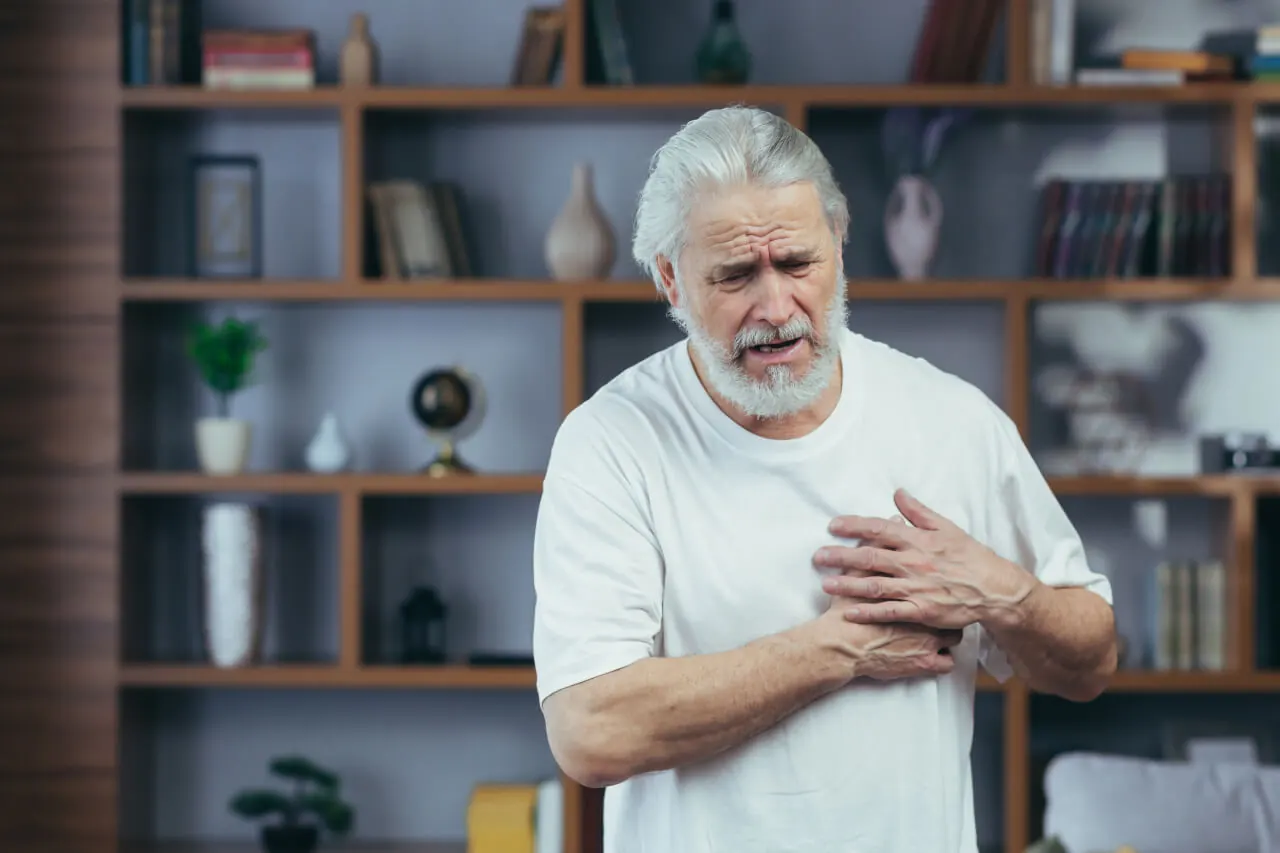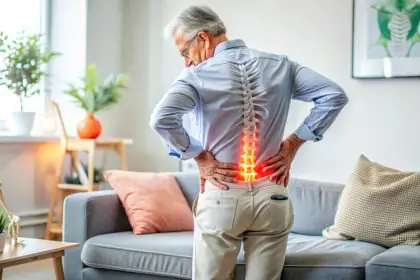One typical symptom that might have a wide range of reasons is chest discomfort.
Some of them are serious and require immediate medical attention, while others are less worrisome and can be managed at home.
In this article, we will explore 9 potential causes of chest pain after waking up, and when you should see a doctor for your condition.
1. Heart-related causes
One of the most serious and common causes of chest pain is a heart attack, which occurs when the blood flow to the heart muscle is blocked by a clot or a plaque in the coronary arteries.
A heart attack can cause severe, crushing, or squeezing pain in the center or left side of the chest, that may radiate to the arm, jaw, neck, or back.
Other symptoms of a heart attack include shortness of breath, sweating, nausea, vomiting, dizziness, or fainting.
A heart attack is a medical emergency and requires immediate treatment to prevent permanent damage to the heart or death.
Another heart-related cause of chest pain is angina, which is a condition where the heart muscle does not get enough oxygen due to narrowed or blocked coronary arteries.
Angina can cause chest pain that is similar to a heart attack, but usually less severe and lasts for a shorter time.
Angina can be triggered by physical exertion, emotional stress, cold weather, or eating a large meal.
Angina can be a sign of an underlying heart disease and should be evaluated by a doctor.
Other heart-related causes of chest pain include pericarditis, which is an inflammation of the sac that surrounds the heart; aortic dissection, which is a tear in the inner layer of the aorta, the largest artery in the body; and myocarditis, which is an inflammation of the heart muscle.
2. Digestion-related causes
Another common cause of chest pain is gastroesophageal reflux disease (GERD), which is a condition where the stomach acid flows back into the esophagus, the tube that connects the mouth to the stomach.
GERD can cause a burning sensation in the chest, often called heartburn, that may worsen when lying down or bending over.
GERD can also cause other symptoms such as regurgitation, difficulty swallowing, coughing, hoarseness, or sore throat.
GERD can be treated with lifestyle changes, such as avoiding spicy, fatty, or acidic foods, losing weight, quitting smoking, and elevating the head of the bed.
Medications, such as antacids, proton pump inhibitors, or H2 blockers, can also help reduce the acid production and relieve the symptoms.
Other digestion-related causes of chest pain include esophageal spasm, which is a sudden contraction of the esophageal muscles; esophageal rupture, which is a tear in the esophageal wall; and peptic ulcer, which is a sore in the lining of the stomach or duodenum, the first part of the small intestine.
3. Respiratory-related causes
Another possible cause of chest pain is a respiratory infection, such as pneumonia, bronchitis, or COVID-19.
These infections can cause inflammation and irritation of the lungs and the airways, leading to chest pain that may be sharp, stabbing, or dull.
The chest pain may worsen with breathing, coughing, or sneezing. Other symptoms of respiratory infections include fever, chills, cough, sputum, shortness of breath, or wheezing.
Some respiratory infections, such as COVID-19, can be very serious and may require hospitalization or intensive care.
Other respiratory-related causes of chest pain include asthma, which is a chronic condition that causes the airways to narrow and swell, making it hard to breathe; pleurisy, which is an inflammation of the membranes that cover the lungs and the chest wall; and pneumothorax, which is a condition where air leaks into the space between the lungs and the chest wall, causing the lung to collapse.
4. Myocarditis
Myocarditis is an inflammation of the heart muscle, usually caused by a viral infection, such as influenza, COVID-19, or coxsackievirus.
Myocarditis can cause chest pain that may be similar to a heart attack, but may also be accompanied by other symptoms, such as fatigue, fever, palpitations, or shortness of breath.
Myocarditis can affect the heart’s ability to pump blood and may lead to complications, such as arrhythmias, heart failure, or cardiogenic shock.
Myocarditis can be diagnosed by blood tests, electrocardiogram, echocardiogram, or cardiac MRI.
5. Pancreatitis
Pancreatitis is an inflammation of the pancreas, a gland that produces digestive enzymes and hormones, such as insulin and glucagon.
Pancreatitis can cause severe, constant, or radiating pain in the upper abdomen, that may spread to the chest, back, or shoulders.
The pain may be worse after eating, drinking, or lying down.
Other symptoms of pancreatitis include nausea, vomiting, fever, jaundice, or abdominal swelling.
Pancreatitis can be caused by gallstones, alcohol abuse, trauma, infection, or medication.
Pancreatitis can be diagnosed by blood tests, abdominal ultrasound, CT scan, or MRI.
Pancreatitis can be a life-threatening condition and may require hospitalization or intensive care.
6. Gallstones
Gallstones are solid deposits of cholesterol or bile that form in the gallbladder, a small organ that stores and releases bile, a fluid that helps digest fats.
Gallstones can cause sudden, severe, or cramping pain in the upper right abdomen, that may radiate to the chest, right shoulder, or back.
The pain may be triggered by eating fatty or greasy foods, and may last for several minutes to hours.
Other symptoms of gallstones include nausea, vomiting, indigestion, or jaundice.
Gallstones can be diagnosed by blood tests, abdominal ultrasound, or MRI.
Gallstones can be treated with medications, such as bile acid pills or ursodiol, that help dissolve the stones, or with surgery, such as laparoscopic cholecystectomy, that removes the gallbladder.
Gallstones can cause complications, such as cholecystitis, which is an inflammation of the gallbladder; choledocholithiasis, which is a blockage of the bile duct by a stone; or pancreatitis, which is an inflammation of the pancreas.
7. Pulmonary Hypertension
Pulmonary hypertension is a condition where the blood pressure in the lungs is abnormally high, making it harder for the heart to pump blood to the lungs.
Pulmonary hypertension can cause chest pain that may be dull, tight, or pressure-like, and may worsen with exertion or lying down.
Other symptoms of pulmonary hypertension include shortness of breath, fatigue, dizziness, fainting, swelling of the legs or abdomen, or cyanosis, which is a bluish color of the skin or lips.
Pulmonary hypertension can be caused by various factors, such as lung diseases, heart diseases, blood clots, sleep apnea, or genetic disorders.
Pulmonary hypertension can be diagnosed by physical examination, chest X-ray, electrocardiogram, echocardiogram, or right heart catheterization.
Pulmonary hypertension can be treated with medications, such as vasodilators, diuretics, anticoagulants, or oxygen therapy, that help lower the blood pressure and improve the blood flow.
In some cases, pulmonary hypertension may require surgery, such as lung transplantation or atrial septostomy, that create a hole between the upper chambers of the heart to relieve the pressure.
8. Pulmonary Embolism
Pulmonary embolism is a condition where a blood clot travels from another part of the body, usually the legs, and lodges in the lungs, blocking the blood flow and oxygen supply.
Pulmonary embolism can cause sudden, sharp, or stabbing chest pain that may worsen with breathing, coughing, or moving.
Other symptoms of pulmonary embolism include shortness of breath, coughing up blood, rapid heartbeat, sweating, or fainting.
Pulmonary embolism is a medical emergency and requires immediate treatment to prevent permanent damage to the lungs or death.
Pulmonary embolism can be diagnosed by blood tests, chest X-ray, CT scan, or ventilation-perfusion scan.
Pulmonary embolism can be treated with medications, such as anticoagulants or thrombolytics, that help dissolve the clot or prevent new clots from forming, or with surgery, such as embolectomy or inferior vena cava filter, that remove the clot or prevent it from reaching the lungs.
9. Other Causes of Chest Pain After Waking Up
There are some other causes of chest pain after waking up that are less common or rare, but still worth mentioning.
These include:
Costochondritis, which is an inflammation of the cartilage that connects the ribs to the sternum, causing chest pain that may be sharp, dull, or burning, and may worsen with movement, breathing, or coughing.
Tietze syndrome, which is a rare condition where the cartilage of the ribs or sternum becomes swollen and tender, causing chest pain that may be similar to costochondritis, but also involves visible swelling of the chest wall.
Anxiety or panic attacks, which are episodes of intense fear or nervousness that can cause chest pain that may be sharp, tight, or pressure-like, and may be accompanied by other symptoms, such as palpitations, trembling, sweating, hyperventilation, or a sense of impending doom.
Muscle strain or injury, which can cause chest pain that may be sore, achy, or bruised, and may worsen with movement, breathing, or coughing.
Rib fracture or bruise, which can cause chest pain that may be sharp, stabbing, or throbbing, and may be associated with a history of trauma, such as a fall, a car accident, or a sports injury.
Shingles, which is a viral infection that causes a painful rash on one side of the body, usually along a nerve.
Shingles can cause chest pain that may be burning, tingling, or itching, and may be preceded by a prodrome of fever, headache, or malaise.
When You Should See a Doctor
Chest pain is a symptom that should not be ignored, as it can indicate a serious or life-threatening condition.
You should see a doctor immediately if you experience chest pain that:
Is severe, crushing, or squeezing, and lasts for more than a few minutes
Spreads to the arm, jaw, neck, or back
Is accompanied by shortness of breath, sweating, nausea, vomiting, dizziness, or fainting
Occurs with exertion, stress, or cold weather, and improves with rest or nitroglycerin
Is sudden, sharp, or stabbing, and worsens with breathing, coughing, or sneezing
Is associated with coughing up blood, rapid heartbeat, swelling of the legs or abdomen, or cyanosis
Is new, different, or unexplained, and does not go away with home remedies
You should also see a doctor if you have chest pain that occurs frequently, interferes with your daily activities, or affects your quality of life.
Your doctor can perform a physical examination, ask you about your medical history and risk factors, and order some tests, such as blood tests, electrocardiogram, chest X-ray, or CT scan, to determine the cause of your chest pain and prescribe the appropriate treatment.
Conclusion
Chest pain is a common symptom that can have many different causes, some of them serious and some of them less worrisome.
The type, location, duration, and intensity of the chest pain, as well as the presence of other symptoms, can help narrow down the possible causes and guide the diagnosis and treatment.
If you wake up with chest pain, you should not ignore it or dismiss it as a minor issue, but seek medical attention as soon as possible, especially if the chest pain is severe, persistent, or accompanied by other alarming signs.
Remember, chest pain can be a sign of a heart attack, which can be fatal if not treated promptly.
Therefore, it is better to be safe than sorry, and consult your doctor if you have any doubts or concerns about your chest pain.
FAQs
What are the common causes of waking up with chest pain?
Waking up with chest pain can be attributed to various factors, including indigestion, muscle strain, anxiety, sleep position, or even a respiratory issue.
Is chest pain upon waking a sign of a heart problem?
While chest pain can be associated with heart issues, it’s not always the case.
Other causes like acid reflux, costochondritis, or even stress could be responsible.
However, it’s crucial to consult a healthcare professional for an accurate diagnosis.
How does sleep position contribute to chest pain?
Sleeping in an awkward position or putting pressure on the chest can lead to muscle strain or discomfort.
It’s important to find a comfortable sleeping posture to minimize the risk of waking up with chest pain.
Can anxiety cause chest pain in the morning?
Yes, anxiety can manifest physically, and morning chest pain is one possible symptom.
Stress and anxiety may lead to muscle tension, creating discomfort in the chest area.
Is indigestion a common culprit for morning chest pain?
Absolutely. Indigestion, especially if you’ve had a heavy meal close to bedtime, can cause discomfort and chest pain upon waking.
This is often due to acid reflux.
When should I seek medical attention for morning chest pain?
If you experience persistent or severe chest pain, especially accompanied by other symptoms like shortness of breath or pain radiating down the arm, seek immediate medical attention.
It’s always better to rule out serious conditions like a heart attack.





